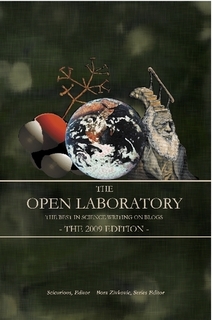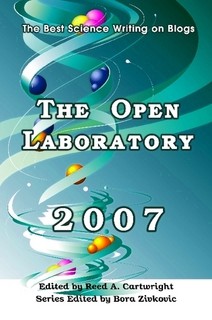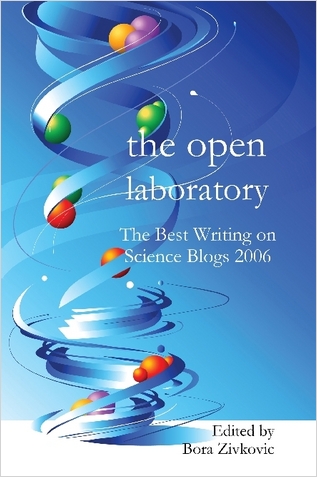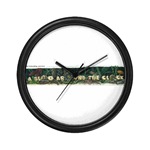Almost a year ago, Nature published a set of opinion articles, including Science journalism: Toppling the priesthood by Toby Murcott. I did not react at the time, but JR Minkel and Jessica Palmer did and got some interesting responses in the comments. The article was brought to my attention by Gozde Zorlu who is ruminating on the same ideas and will have a blog post about it shortly (and I will let you know when it's up).
The article covers a lot of ground and has many layers. I finally read it and these are just some really quick thoughts, just to provoke discussion.....
First, Murcott is complaining about being essentially a lay-person outside of his own domain in biochemistry. That is true. Science reporters who don't have any scientific background are in an even worse shape - they definitely have a handicap, but not something they cannot overcome with years of study. But for this, they need to have the freedom to focus on only one area of science, e.g., Andy Revkin focusing on climate, Carl Zimmer on evolution, etc. I wrote a little bit about this before.
If you have spent some time in science before moving into journalism, you understand that years of total immersion in the field are necessary to fully understand it - I mean a narrow field! And not just the purely scientific information, but also historical, philosophical and social context, who-is-who in the field, relative strengths of various hypotheses, etc. You understand that it is impossible for a single person to gain a full understanding of every area of science.
- Can you play violin?
- Sure, of course
- Have you ever played?
- No. But it looks easy, I'm sure I can do it.
This is how non-scientists often think about science. This includes some journalists, until they get started on science reporting and realize that it's not as easy as it looks. But their editors do not grok it. Editors think of 'science' as a single thing - there is a sports-guy and a fashion-guy and a science-guy in the newsroom and they get assignments accordingly. Which means that the poor science reporter has to report on everything from cosmology to math to medicine to ecology with no time to actually study these areas sufficiently to understand them. Of course they get nervous and exhausted and touchy... ;-)
But in the era where newsrooms are firing in-house journalists and relying more and more on freelancers, this is an opportunity for freelance journalists to put a stake into a particular territory: specialize in one field and refuse to write stories outside it. That way, a journalist who has become, over years of study and reporting, an expert in field A, will only report on A, will be on rolodexes (I guess not virtual but real physical ones) of every editor in the country/world for stories on A and will be asked all the time by everyone to cover A. And will do it really well. Each editor will have a list of experts on A, B, C and every other area of science. With specialization, biochemists will not have to risk showing off their ignorance of astronomy, media organizations will know they have all topics covered by the best of the best, and the general quality of reporting science will increase.
In the next segment of the article, Murcott seems to want more investigative science journalism. But, compare this to this. Connie St.Louis and I have the opposite ideas what science journalism is. I am not specifically targeting Connie, it just happens that I am aware of her post that puts into words, very clearly, what many other journalists say or at least hint at.
Everything that I think is science journalism, she dismisses as not being 'real' science journalism: science reportage and explaining. And one aspect of it that she thinks is the real science journalism is the only one I think is really not - "investigative science journalism" is, in my book, just the regular investigative journalism in which the people under scrutiny just happen accidentally to be scientists. The former (science reporting and explaining) requires that the journalist understands science, the latter (investigating potential misconduct by people who happen to be scientists) does not. As I said before, if the investigation involves analysis of data, it is done by scientists and reported in specialized media: scientific journals (these can be then translated into lay language by journalists and reported to the general audience). If the investigation involves potential misconduct of humans who happen to be scientists, it is done by journalists, but it is not science journalism any more - it is more something like political journalism (as misconduct usually involves money and prestige).
Steve Mirsky (editor at Scientific American: here on Twitter ) once said, and I agree with him, that all of science journalism should be activist: evangelizing for truth (not capitalized). There is no mealy-mouthed HeSaidSheSaid, False-Balance, View-From-Nowhere tabulation of opinions held by people. Science journalism is straightforward: this is how the world works and this is how we learned it.
Which brings me to another important question: why professional journalists dismiss Press Information Officers. If journalists think that journalism that investigates scientists is what should be called 'science journalism', and see that what PIOs are doing is not that, they will not think of PIOs as journalists. On the other hand, if you agree with me that investigation of scientists is not science journalism, but reporting and explaining science is, than PIOs, many of whom have science degrees, are actually doing the brunt of science journalism these days. Sure, not all of them are perfect, and not all press releases are good, but they are getting better (as science majors are replacing j-school majors as PIOs at many institutions), they are, seeing how media is crumbling, starting to see themselves as serious journalists filling the void left by the massive layoffs of science reporters in the MSM, and are writing better and better copy, usually much better than what remaining newsroom reporters write under horrendous deadlines and pressure.
In other words, as we realize that scientists, PIOs, journalists and audience are in it together, collaborating on science reporting, we need to eliminate this antagonism between newsroom journalists and institutional journalists (formerly known as PIOs). For that antagonism to be eliminated, the two need to agree on what the definition of science journalism is. And I don't think defining it as 'investigating potential misconduct of scientists' is a good and healthy definition. It is much more productive to leave that kind of stuff to political reporters (who will be tipped off by scientists themselves, as was always the case: all data-fudging was first discovered by other scientists, the only people with expertise to notice it in the first place) and have everyone focus on real science journalism - reporting and explaining science.
Next, Murcott wants to move science journalism from a) presenting facts (including results of latest studies), to b) presenting how scientists work and their method. He, and many others, forget that the key element is the third level: c) trust. Read this carefully to understand why. So, all three things need to be reported. Eyeing every paper and every press release as suspect, and treating scientists as dishonest until proven otherwise, is one of the journalistic techniques that undermines the trust in science. Whose side are you on, guys? Creationists, GW-denialists, HIV-denialists and anti-vaccers? Job of a journalist is to explain the world as it is. Science is the best method to figure out how the world works. Use this method as a journalistic method.
Scientific method has several (actually many) elements in phases, but one can oversimplify here: get an idea, test it, communicate it. Yes, communicating science is a part of scientific method. Which is why both scientists and journalists have to do it, hopefully together as allies, not as opponents eyeing each other with suspicion. See also many of the reports from scio10 - almost all of them focus on the need for collaboration between scientists, press officers and journalists, not antagonism. It's a new ecosystem today. And the new niche for science journalists is NOT the top predator any more - the mindset has to shift from the competitive to a collaborative view of media ecology.
More and more people studying the evolution of media are coming around to the idea that the job of a journalist these days is a person who collects, aggregates and interprets information. Even data.
The story is important, as humans are storytellers by nature, but the story is a hook that takes people to the wealth of underlying information, the background, and the data. Each news-report needs to be embedded in a broader structure that also contains an "explainer". Which is why it is essential for the story, the "hook", to link to all the relevant background information and data.
Finally, we get to Murcott's wish to see reviews....the reviews that scientists have written during the process of peer-review of manuscripts. Murcott, pressed for time, thinks that being able, as a journalist, to see the reviews, would help him understand the story better and glean some of the context that he is missing because is writing a story outside of his area of expertise and has not time to study it first. In essence, he is asking for a shortcut that helps him do his job. But he is not considering how this would affect the review process.
First, it is important to remind everyone that peer-review is a very new thing. Only one minor paper by Einstein went through peer-review. Nature only started experimenting with it in the late 1960s. Yet lots and lots of great science was published before this was instituted. There is no data supporting the view that peer-review actually does much good.
We at PLoS ONE are trying to improve the process. What we have noticed (and most of our academic editors and authors agree) is that by eliminating the need for reviewers to evaluate if a manuscript is novel, exciting, revolutionary, paradigm-shifting, mind-boggling and Earth-shaking, and only asking them to evaluate the technical aspects of the work, the review becomes MUCH better:
As the scientific paper itself evolves, more and more of the peer-review will happen after publication, on the paper or connected to it and journalists need to be a part of it.
You can search the Web for many discussions of "open review" and you will see that there are many more cons than pros. The reviewers will find it difficult to be frank. Fewer people will agree to review (and there is already too many manuscripts for the available number of reviewers). Showing reviews to journalists would have exactly the same effect, for good or ill. Having a journalist see reviews is ...a crutch for a journo who does not have the time, or expertise, or inclination to do the heavy lifting of personal education and everybody would object to this, rightly so.
Specialization of journalists - each grabbing one's own area of expertise - and the collaborative journalism done by scientists, PIOs, journalists and audience, would make a 'peek' at reviewers' comments unnecessary and irrelevant. The collective WILL have all the necessary expertise and historical/philosophical/sociological/theoretical/methodological context to get the story (and attached data/information) right.














Comments
Coturnix: If the investigation involves potential misconduct of humans who happen to be scientists, it is done by journalists, but it is not science journalism any more - it is more something like political journalism (as misconduct usually involves money and prestige).
More exactly, the journalism is no longer covering matters of Science as a philosophical discipline, working in the Contexts of Experience (of the universe), Inspiration (to conjecture), Formulation (of hypotheses), and Testing (to become theory); or even of Science as an Engineering enterprise (the above, plus adding the context of Design of experiment); but of Science as an anthropological practice (which includes all the usual bullcrap associated with dealing with humans).
Coturnix: Next, Murcott wants to move science journalism from a) presenting facts (including results of latest studies), to b) presenting how scientists work and their method. He, and many others, forget that the key element is the third level: c) trust.
I would also suggest that this overlooks a fundamental aspect of Science as philosophical discipline: the "how scientists work" is, in large part, IRRELEVANT to science. It does not matter in the context of Inspiration and Formulation how you develop conjectures and hypotheses. You may drink excessive amounts of coffee, watch apples fall by moonlight, dream of cannibal snakes, or receive answers inlaid in platinum on tablets of gold delivered by Seraphim choir. The means that the candidates arrive at the context of Testing is moot. All that matters is the Testing results.
(In anthropological practice, there might be co-authorship issues at publication time with the last method.)
Coturnix: Scientific method has several (actually many) elements in phases, but one can oversimplify here: get an idea, test it, communicate it.
I would argue that "communicate it" is part of the anthropological practice, but not an essential part of the philosophical discipline. Even science done in secret for benefit to a select few is still philosophically science -- EG, the research done to support the Manhattan project. The decision of "communicate it" (or not) is a political one.
("Get an idea" corresponds well to the traditional "Context of Discovery", and "test it" to the traditional "context of justification". The former corresponds roughly to lumping what I refer to as Formulation in with Inspiration, and the latter lumping Experience in with Testing; I prefer my divisions for mathematical reasons.)
Coturnix: Having a journalist see reviews is ...a crutch for a journo who does not have the time, or expertise, or inclination to do the heavy lifting of personal education
Or perhaps a shortcut for journalists who want easy sensationalism via claims of controversy.
In so far as communication is part of the anthropological practice of science, the emphasis is made on accuracy; in contrast, due to short-term marketplace demands, contemporary journalism emphasizes the exciting. Accuracy is seldom exciting; it is dull to the point of tedium. If the journalism wants more whatever from science, they need to find a way to give more of something science wants, rather than trying to con science into doing something against its own interests for the benefit of journalism.
Posted by: abb3w | March 10, 2010 3:48 PM
As a practical matter I don't think the reviewers comments would help Murcott unless he was a specialist in the same field. Since reviewers are usually chosen as specialists in the same field as the paper they are offering criticism of, they tend to use the shorthands of the field. Unless you were familiar with these, you wouldn't make much sense of the reviewer's comment, and possibly misinterpret what they mean. It'd just re-invent the non-scientist interpretation problem again in a new form without any positive benefit AFAICS.
I'll have read more later to see how your definitions compare to my own. I suspect I've used different terms to separate the same concepts. I'm bringing this up, because it occurs to me that part of the issue may not the people have different understandings of the concepts but that simply they're placing inconsistent labels on the concepts?
Posted by: Grant | March 10, 2010 3:50 PM
abb3w,
I would argue that "communicate it" is part of the anthropological practice,
I get your point, but I'd quibble that if you don't communicate, you can't get the peer-review of your colleagues. If you lock yourself up in a tower, slave away for years without either reading others' work or sharing your own (and taking on board the criticism of it), you'd almost certainly wind up believing some very strange things :-)
(Aside from having horribly long hair, grotty clothes, smelling foul...)
I agree that there is a political aspect to publishing, though.
Posted by: Grant | March 10, 2010 4:15 PM
Grant: If you lock yourself up in a tower, slave away for years without either reading others' work or sharing your own (and taking on board the criticism of it), you'd almost certainly wind up believing some very strange things
This can be traced mostly to the unreliability of humans at doing computation. If multiple people examine a paper, they are less likely to all make the exact same mistake -- akin to re-running an Arthur-Merlin proof test multiple times. (There's also the problems of how insanely broad the search space is, how imperfectly human cognition implements the search strategy, and how costly conjecture and hypothesis development are.) Finding other people to criticize in the development seems part of "test it".
Posted by: abb3w | March 10, 2010 5:21 PM
abb3w: "I would also suggest that this overlooks a fundamental aspect of Science as philosophical discipline: the "how scientists work" is, in large part, IRRELEVANT to science."
While science is supposed to be a process independent of bias and culture, understanding how scientists work is a very important role that journalists can play towards helping integrate science into the rest of society. Who is doing science, and how they are doing it, is a great precursor to what kind of science is being done.
Whether their results can be stripped of bias and proved internally consistent with other current theories is great; but there will never be enough scientists to tackle every question, so finding out where they are coming from is indeed extremely important, not to mention interesting.
Coturnix: "Job of a journalist is to explain the world as it is. Science is the best method to figure out how the world works. Use this method as a journalistic method."
The role of science journalists isn't to play mouth-piece to science. Scientists can do that quite well themselves. Journalists are meant to find ways to convey their beats clearly to their audience, giving as much context and potential for understanding as possible. (Good) science journalists also skirt that fine line between understanding science, but not being part of the science industry. This leaves them situated to properly play their watchdog role, along with their popularizing and contextualizing roles.
Posted by: Colin | March 10, 2010 9:17 PM
Actually, the point of this post is that in this day and age, science journalism = science communication. In other words, to use the snide expression journalists like to use, it is the science journalist's role to be a "mouth-piece" for science. This post is really an argument that journalists need to stop imagining that only journalism worth its name is investigative journalism. This post is just one in several (all linked within, providing context) showing my evolution in thinking about this. And more I think about it, less I consider 'investigating people who just happen to be scientists' to be within the definition of science journalism.
'Investigating people who just happen to be scientists' does not require understanding of science. It can be done by a science reporter, but it can also be done by any kind of reporter. I would even argue that it is better if it is done by someone else in the newsroom - a good science journalist WILL be too cozy with scientists, necessarily so (and it is a GOOD thing), and thus unleashing an eager bloodhound from a different beat onto potential mis-behavers in the scientific community would probably yield the best result.
Posted by: Coturnix | March 11, 2010 10:48 AM
Richard Gayle makes an important point about 'silos' and overspecialization in science and a fear that it should not be replicated and reinforced in science journalism as well.
I agree - when I was talking about "specialized beats" and "expertise", I was not going as narrow as scientists go. If you do research on estrogen receptor alpha in mice, you know that field through-and-through, you also know everything about estrogen receptor beta, you may have heard that fish have estrogen receptor gamma, you are probably somewhat up to speed on the literature on progresterone and testosterone receptors....but have no ideas about zebrafish embryonic development. Science journalists will never be that narrow. You may have mol/cell/dev biology beat and eco/evo/paleo beat, and a physics/astronomy beat, etc. Much broader than in science itself.
Posted by: Coturnix | March 11, 2010 11:15 AM
Once the scientists have found that the data on Wonderdruginol was faked, then the journalists-who-report-on-science can convey the public an understanding of the molecular biology involved, while the investigative journalists follow the money. Any story big enough has to be covered from multiple angles.
Posted by: Blake Stacey | March 11, 2010 3:30 PM
This may be my favourite thing from you yet.
Posted by: Ed Yong | March 12, 2010 2:43 PM
I'm not sure your characterization of the history of peer review is accurate. Peer review occurred but it was in a more informal sense with editors and the like deciding what to publish or not publish. The modern peer review system is also in some sense a response to the much larger number of scientists out there than there were 70 or a 100 years ago which without peer review might make the signal to noise ratio much worse.
Posted by: Joshua Zelinsky | March 12, 2010 3:45 PM
@Blake: Yes, of course, a multifacated story will require multiple reporters on the job, each bringing a different type of expertise.
@Ed: Thank you, sir!
@Joshua: Sure, peer-review did not get invented out of the blue one day, it evolved out of prior practices. I was specifically referring to the sense of the term that people who reify its use: review by multiple external reviewers, usually anonymous.
Posted by: Coturnix | March 12, 2010 3:50 PM